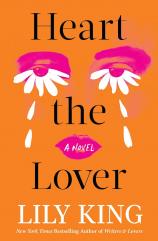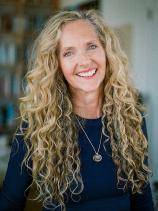Reading Group Guide
Discussion Questions
Heart the Lover

1. For most of the novel, the narrator goes by a nickname given to her by Sam and Yash --- “Jordan” --- after the character from THE GREAT GATSBY. Later, Yash and Jordan call each other “Hink,” and Yash affectionately calls Sam’s children “tadpoles” and Marni’s daughters “the pigeons.” How do nicknames create --- or deflect --- intimacy throughout the book? Is Jordan a good name for the narrator?
2. How does gender shape Jordan’s education compared to Yash’s and Sam’s? Consider especially their relationships to their professors.
3. Jordan essentially moves into the Breach House with Sam and Yash for her senior year. She is enamored with not only the boys but their lifestyle --- one dominated by reading, play and intellectual debate. What makes the Breach House so special to Jordan? What does it teach her about herself? Have you ever created a sense of home like that?
4. As Jordan is getting to know Sam, Yash and Ivan, she reveals that Cyra, a girl she lived with briefly the previous summer, was raped and killed shortly before the semester began. Yash soon reveals that he was also at Cyra’s funeral and saw Jordan there. What did you make of this connection and of Cyra’s death? How does it connect to the broader theme of gender in the book --- including Jordan’s father’s treatment of his second wife, Yash’s father’s view of his mother, and EJ’s anger towards Marni? How does it impact Jordan and her relationships with Sam and Yash?
5. Jordan, Sam and Yash all view their lives and relationships through the lens of books and stories: INDEPENDENT PEOPLE, THE AENEID, Augustine’s CONFESSIONS, ULYSSES, THE GREAT GATSBY. Pick one of these books and consider how it relates to the novel. Or, discuss your own relationship to books. Have you ever had a book shape a romance or friendship the way they do for Jordan, Yash and Sam?
6. Discuss Jordan’s relationship with Sam. What connects them? Where does their conflict come from? How does Sam treat Jordan and make Jordan feel, compared to Yash?
7. As much as this book is about romantic love, it’s also a testament to friendship. How did you understand Sam and Yash’s friendship throughout the book? What do they give each other? How does that change?
8. Before Yash’s visit to Paris, Jordan gets conflicting advice about her relationship. Léa tells her that she’ll never feel as strongly about anyone again and that she should marry Yash, whereas Nobiko tells her to let him go (109-110). Did you agree with one woman’s advice more than the other? What does the book have to say about how we should understand first loves?
9. After Yash’s visit to Paris, Jordan remembers her elementary school boyfriend breaking up with her when she revealed how much she liked him. She writes, “I haven’t told Yash that story. I didn’t want him to see it as a cautionary tale” (127). Pick a moment from the first part of the book and consider how it plays out in the second and third. Where can you spot “cautionary tales,” or foreshadowing, in the novel?
10. At the end of part one, we make a shocking discovery about Jordan. Reread the sentence that reveals this to us (128). What was it like to learn this, and why do you think King chose to reveal this news in this way?
11. During the Immortality seminar, Yash and his professor argue about the definition of “hamartia.” Dr. Gastrell defines hamartia as a “tragic flaw,” while Yash translates it to a “random error of judgment,” saying, “the power and poignancy come from the very randomness itself, the sense that any one of us, not just a good king with a built-in flaw, is capable of making a mistake” (93). Decades later, Yash tries to describe his actions after Paris as a momentary lapse in judgment, while Jordan connects them more deeply to Yash’s identity. How do you interpret Yash’s decision --- as a random error of judgment or a tragic flaw? What does either interpretation mean for the book at large?
12. After the opening page, which is addressed to “you,” the novel’s voice shifts between third person (“Yash”) and second person (“you”). What was the effect of both voices on your reading experience? Why do you think King structured the novel in this way?
13. Compare Jordan’s marriage to her relationship with Yash. What does each reveal about passion, connection and commitment? Did either relationship remind you of periods in your own life?
14. Yash has a deep connection with children --- Marni’s daughters, Sam’s sons, Léa’s children, and even Jordan’s boys, brief as their meeting was, to whom he becomes “Yash in the tree.” What role do children play throughout the novel, and what does Yash’s connection with children reveal about him as a character?
15. During her narrative in part two, which is addressed to Yash, Jordan repeatedly writes, “Why are you here?” In part three, we find out precisely why Yash made that visit (202). How did this change your reading of the second part of the book? Does it answer Jordan’s question?
16. Jordan’s editor describes love in her novels as “a form of hope” (188). Apply this idea to HEART THE LOVER. Does love act as a kind of hope, or, as her editor argues, is it “crushing...something you let yourself feel at your own peril, despite your better sense” (188)? What does Jordan believe about love? What do you?
17. When Yash says that he’s afraid of the concept of eternity, Jordan argues, “Only if time exists as we experience it. Which we know it does not. Without time, eternity loses its bite” (238). The structure of the novel plays with time quite a bit. Part one covers years, while part two lasts a single day and night. In part three, time slips by at a dreamlike pace --- flight after flight missed, hours lost, meals skipped. How did you experience the passage of time in the book? In particular, discuss what King might have been illustrating about trauma, grief and memory by using time in this way.
18. Goodbyes come up a lot throughout the novel. In part three, Sam tells Jordan, “Say goodbye. Goodbyes are important” (225). When do goodbyes happen in the book, and when do they not? Can a missed goodbye ever be made up?
19. In part three, Yash says of marriage, “I don’t think I would have been good at it. Maybe a quarter of the time. The rest of the time I’d want to be alone” (236). Sam makes a similar observation about Yash, saying, “He chose to spend his life alone. It’s not something that just happened to him” (225). EJ, too, tells Jordan, “He pushes everyone away at one time or another” (192). Discuss Yash’s need for solitude and tendency to withdraw. Where do you see it appearing in the first part of the novel, especially in his and Jordan’s relationship? Where do you think it comes from?
20. Both Yash and Jordan’s son, Jack, navigate unexpected illness in part three. What did you make of this parallel? How does Jordan seem to understand it, and how does her experience with Jack inform her relationship with Yash?
21. For those who already had read WRITERS & LOVERS, when did you realize who “Jordan” really was? How did that impact your reading of the book? If you haven’t read WRITERS & LOVERS, what did you make of the final scene? What might King be saying about belonging, love and being known, here and throughout the novel?
Heart the Lover
- Publication Date: September 30, 2025
- Genres: Fiction, Women's Fiction
- Hardcover: 256 pages
- Publisher: Grove Press
- ISBN-10: 0802165176
- ISBN-13: 9780802165176







